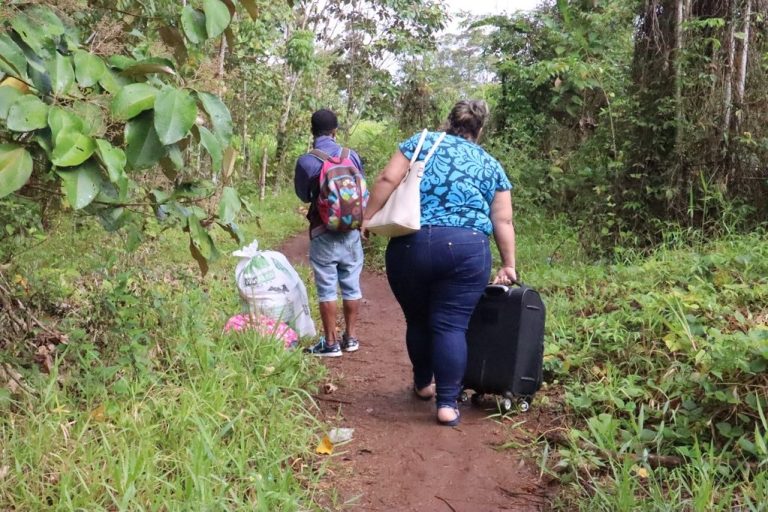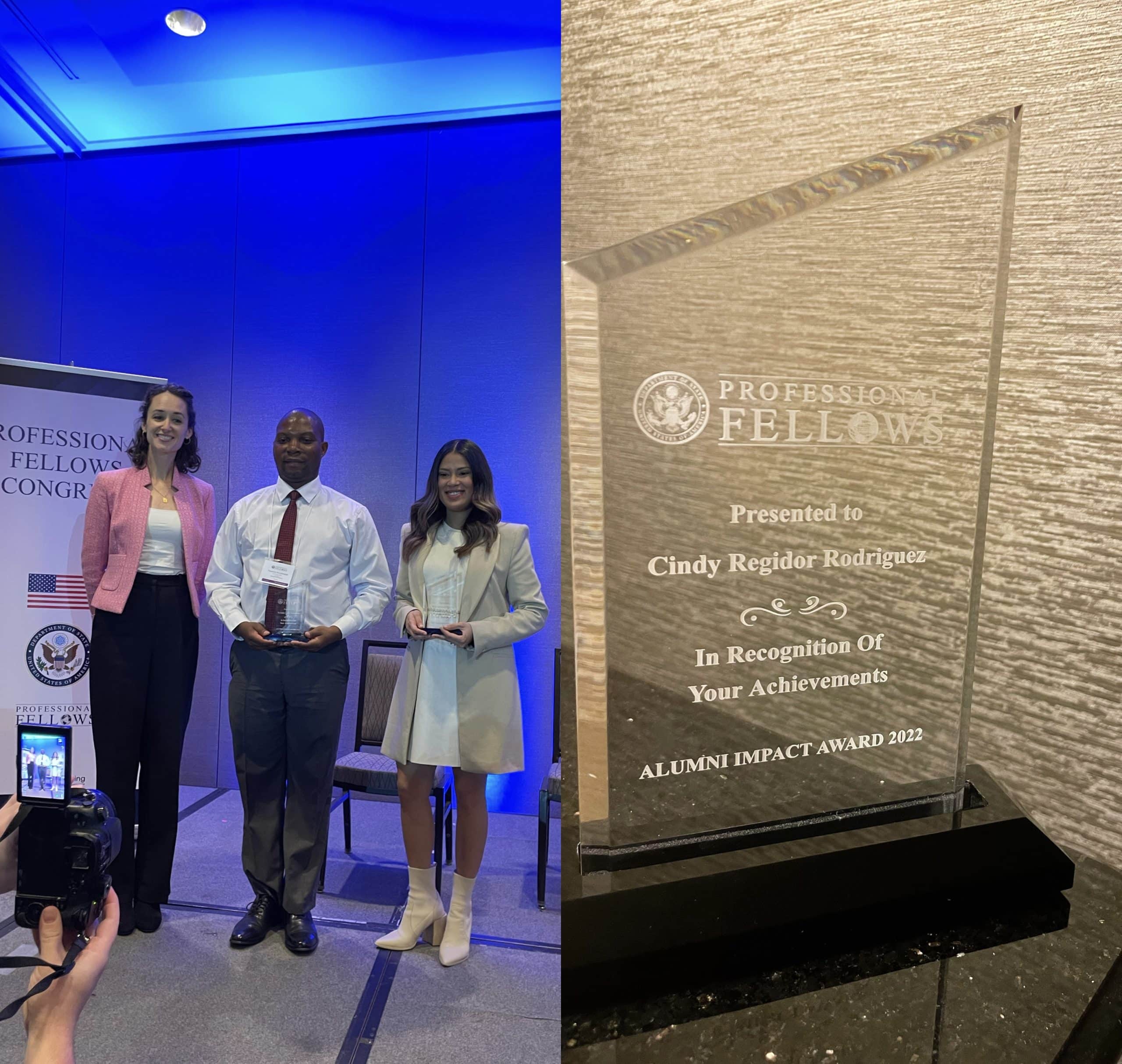8 de noviembre 2022

Children of Exile: The Births “Sowing Hope” in the Camp of Nicaraguan Farmers

PUBLICIDAD 1M
PUBLICIDAD 4D
PUBLICIDAD 5D
The Nicas Migrantes coverage with a human rights approach has become a pressing need after 500 000 Nicaraguans have left the country since 2018

The Nicas Migrantes coverage with a human rights approach has become a pressing need after 500 000 Nicaraguans have left the country since 2018
On November 2nd, as an alumna of the Professional Fellows Program, I received an award granted by the Department of State of the United States, along with three other winners from the USA, Pakistan and Zimbabwe. We were chosen out of 240 applicants from 65 countries, and we were invited to share our experiences and achievements with 140 Professional Fellows from a wide array of professional backgrounds and from different nationalities who were present at a congress in Washington DC. The award was in recognition of “the exceptional contributions you have made to your community” with Nicas Migrantes, a special section at CONFIDENCIAL. This is the speech I delivered that day.
I am deeply honored and grateful to have been chosen as one of the Alumni Impact Award recipients for 2022. This award is testimony to the importance of a fair, dignified and humane portrayal of migration, one of the most pressing issues in today's world.
As a migrant myself and as a journalist, I identified this need seven years ago when I moved from my country Nicaragua to neighboring Costa Rica, a small, green and peaceful country where over 15 percent of its population is migrant, the vast majority from Nicaragua.
Nicaraguans are the biggest foreign population in Costa Rica and we have made, for decades, many crucial economic contributions as field workers, constituting the backbone of the agricultural sector, picking the beans of one of the world’s finest coffees, as housekeepers, construction workers, security guards, bus drivers, accountants, doctors, nurses and teachers. We have enriched the Costa Rican culture and identity and we have cultivated and grown endless binational bonds as part of our relations with friends, families and neighbors. Yet, our presence in local media, I found, was scarce, often stereotyped and negative at times.
Going through the Nicaraguan media I also noticed that there was very little coverage of Nicaraguan migrants, their lives and struggles and their opinions about the reality of their home country. There wasn't a section or a permanent platform dedicated to this endeavor, which didn't make sense for a country with over 15% of its population living abroad and sending remittances that make up for 18% of the country's GDP.
I also noticed that the governments in Nicaragua throughout the decades hadn’t acknowledged our migrants, as they reflected part of their failure to provide jobs and opportunities for the people that had to leave for Costa Rica, the United States or Spain.
I also sensed from the Nicaraguan society an attitude of detachment from the relatives and loved ones that had left and, therefore, according to this logic, could not have a say about what was happening in the country.
I felt that, as Nicaraguan migrants, we had been marginalized both in our country of origin as in the country we had moved to. We were being left out of the important conversations around identity, our rights, issues, demands and hopes.
In 2018 a severe socio-political crisis hit Nicaragua due to the violent crackdown of massive peaceful protests that demanded the restoration of democracy and rule of law, justice and human rights. The government, instead, responded with more repression resulting in over 300 deaths, thousands of wounded, hundreds of political prisoners and dozens of thousands who fled the country due to political persecution, instability, and the faltering economy in the second poorest country in our hemisphere.
It was only also the beginning of an unprecedented migratory flow ignited by the escalation of repression of an authoritarian regime that has suppressed all civil liberties, imposed a de facto police state, arbitrarily incarcerated over 1600 citizens, including 220 political prisoners who remain in jail, among them civic leaders, journalists, human rights defenders, business leaders, presidential hopefuls, and catholic priests.
The current government has also shut down over two thousand NGOs of all kinds and has censored and closed 54 media outlets, while 140 journalists have been forced into exile.
One of those journalists is our director at Confidencial, Carlos Fernando Chamorro, who has had to leave Nicaragua, not only once, but twice, due to the political harassment, false judiciary charges, the illegal raid of his home and the confiscation of our offices, twice, in Managua.
Under those extremely difficult circumstances we met in Costa Rica, from where the CONFIDENCIAL team works now, as all of my colleagues have also been persecuted and threatened with jail. I started working with the team, focused on documenting the human rights abuses and the crisis in Nicaragua, but we also had this need of fulfilling the gap of in-depth, consistent, diverse, sensitive coverage of the Nicaraguan migrant communities.
Around the same time, three years ago, I was in Washington DC as a fellow and I had put my mind to solidifying this idea as a media entrepreneurship. And thus Nicas Migrantes (Nicaraguan migrants) was born, a permanent journalistic platform about and for the Nicaraguan community abroad.
As we started, we were the only Nicaraguan media dedicating our resources to create unique stories, addressing key issues, portraying Nicaraguan migrants in an ethical manner, highlighting their stories, their needs and successes. Ever since we launched the site, we have seen how other Nicaraguan media outlets are now also covering migration issues in a more consistent manner, which is a trend that serves the Nicaraguan migrants that are now more present in the editorial agenda in Nicaragua.
Our specialized coverage with a human rights approach has become an increasingly pressing need since for the past four years half a million Nicaraguans have left the country of six million inhabitants, mainly for the United States and Costa Rica, risking their lives and surviving perilous journeys, enduring discrimination and hardship just like the millions of other refugees and migrants throughout the world at this moment, who have no choice but to leave their places due to poverty, insecurity, climate change and conflict.
My participation in the Professional Fellows Program gave me the opportunity to escalate this endeavor which is now an entire platform within our website. We have different sections which we have fed with over 400 pieces produced by a team driven by their purpose, professionalism and commitment.

The Impact Award 2022 was granted by the United States Department of State among the alumni of the Professional Fellows Program. The ceremony was on November 2nd in Washington DC. Photo: Courtesy
Nicas Migrantes has grown and consolidated attracting more audiences to the CONFIDENCIAL main channels online. This project has also given me the opportunity to reflect and confirm my purpose as a journalist, which is to create content that is useful to the audiences, which fairly represents them and their realities without bias or sensationalism.
I want to thank the CONFIDENCIAL team, for believing in this entrepreneurship as a way of showing resilience. We have been able to create this very special fruitful project despite the exile, the attacks from the government and the high risks of exercising journalism under a totalitarian dictatorship.
Despite the circumstances, we have achieved many of our goals. We have proudly received an award in Costa Rica for one of our special investigative pieces, which we produced in collaboration with two Costa Rican media outlets. This particular work also contributed to changes in public policies in gender violence.
We were also able to sponsor and produce, along with The Inter American Dialogue, a poll and study about the Nicaraguan population in Costa Rica which portrayed their lack of integration and social mobility.
We were even lucky enough to launch the official song of this project two months ago with one of the most talented and admired songwriters of our country, Luis Enrique Mejia Godoy. It’s a beautiful homage to the Nicaraguan migrants, filled with the essence of who we are and what our project aims at representing.
Thus, Nicas Migrantes, has become a media project that benefits the Nicaraguan society, as it builds bridges between the Nicaraguans who live in Nicaragua and Nicaraguan migrants who deserve to be acknowledged and taken into account in the making of a free, democratic, peaceful and prosperous home country, one where, hopefully, one day many can return safely to.
With each story, at CONFIDENCIAL, we provide a platform to a population that has always been there, but that has not been heard or seen enough, despite its great relevance. We believe that must change and that has started to change.
This project is a testament of the responsibility journalists uphold to staying true to what's at the core of our mission, which is to fulfill the needs of our audiences and represent them as we register, comprehensively, who we are as humanity and what we have gone through. Thank you, again, for recognizing that with this award.
PUBLICIDAD 3M
Periodista nicaragüense desde 2007, con experiencia en prensa escrita, televisión y medios digitales. Tiene una especialización en producción audiovisual y una maestría en Medios de Comunicación, Estudios de Paz y Conflicto de la Universidad para la Paz de las Naciones Unidas. Fundadora y editora de Nicas Migrantes, proyecto por el cual ganó el Impact Award 2022 del Departamento de Estado de EE. UU. Ha realizado coberturas in situ en Los Ángeles (Estados Unidos), México, El Salvador, Guatemala, Nicaragua y Costa Rica. También ha colaborado con France 24, The Guardian, Al Jazeera, BBC World Service. Ha sido finalista y ganadora de varios premios nacionales e internacionales, entre ellos el Premio Latinoamericano de Periodismo de Investigación Javier Valdez, del Instituto Prensa y Sociedad (IPYS), 2022.
PUBLICIDAD 3D